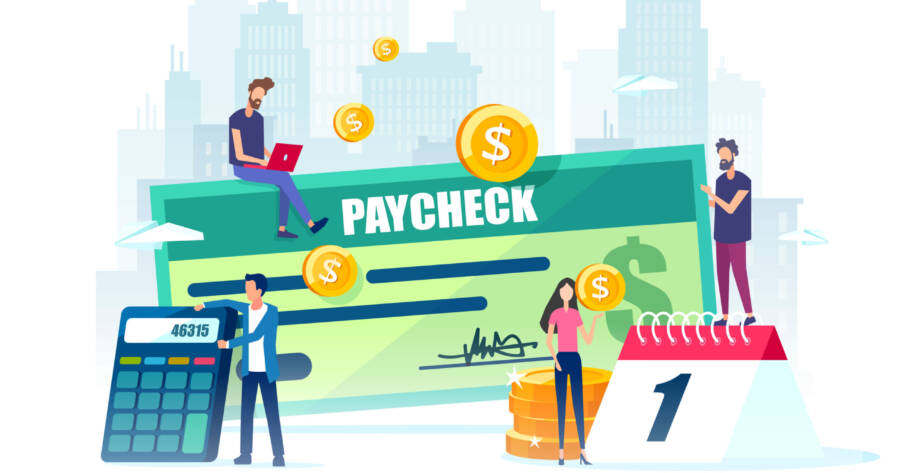Living paycheck to paycheck is not an unusual situation. Many Americans live in that reality every single day of their lives. Modern life is expensive. For most families, it’s easy for a string of bad luck to force their finances into the red. If you’re one of the many Americans who worry about paying their bills every month or meeting basic living expenses, you’re in luck. You’ve come to the right place. The good news is that there are steps you can take to get out of the hole. With some discipline and careful budgeting, you can even build up a safety cushion before you run into serious hardships.
It won’t be easy. It will involve some sacrifices. You’re going to have to make some hard decisions in the short-term in order to save yourself years of anxiety and financial uncertainty. Just know that you can actually improve your current situation, while still building to achieve your long-term dreams. Those are better than satisfying your short-term desires.
Acknowledge Your Current Position
The first step to making any sort of change — including a financial one — is to acknowledge your current position. It’s not always easy to admit that you’re struggling and need to do better. However, being painfully honest about your current earning, spending, and saving habits are an important first step.
If you’re deep in debt, consider the actions that led to this point. No matter your situation, you can find something to improve upon. Be honest about your past (and even your current) shortcomings. Hopefully, there are some very obvious areas you can immediately address. The first step to making a good plan for the future is to know your starting point.
Make a Conscious Decision to Stop Living Paycheck to Paycheck
Say this with me now: “I am going to stop living paycheck to paycheck from now on.” Give yourself a list of reasons why you want to end the cycle. While there are probably countless reasons to get out of this rut, there are some of the most obvious ones.
- Not having to wait until payday to go grocery shopping.
- No more praying that the fumes in your gas tank will keep you going for one more day.
- No more getting into debt for minor purchases.
- Finally building up an emergency fund.
- Stop having your entire paycheck disappear by the day after payday.
Don’t worry, many of us have been there! Think about how good it will feel when payday is just another day of the week. Someday soon, you won’t have to circle those days on your calendar just to make sure you’re meeting your bare minimum expenses.
 Shutterstock
ShutterstockHow Can You Move Forward?
Now that you know where you stand, let’s take the time to figure out what you can do about the situation. You want to be able to move forward and leave the past behind. Take a look at your options. There are probably a few spots where you can cut your expenses. Alternatively, do you have the ability to make a bit more extra money? Both of these things will help the cause.
Sometimes it seems like you have to pick one side or the other. However, you can actually make more money AND cut expenses at the same time. In fact, combining expense cutting with earning some extra money is easily the best way to improve your financial future. Stop spending on things you don’t need. Get your priorities in order. Figure out how to make more money on the side, whether it’s through picking up extra shifts, starting a business, or selling things you no longer use.
Still don’t know where to begin? Let’s start with cutting expenses.
Account for All of Your Expenses and Make a Budget
It will be nearly impossible to get on firm financial ground unless you know exactly where your money is going. It’s also very easy to overspend without a plan in place for your money. That’s why you need to sit down and make a detailed budget.
Having a budget doesn’t have to feel overly restrictive. In fact, after a couple of months, you will probably start feeling more in control and able to make better decisions about your money. Having a plan and working to meet your goals is one of the most liberating feelings there is.
Consider Making Arrangements With Creditors
If your situation is especially dire, it makes sense to prioritize your bills. Identify the bills that need to be taken care of first. Then contact your other creditors to see if there is a way to work out a payment plan. Many of them would rather work out a revised payment plan with you than to sell your debt to a collection agency for much less. Sometimes you just have to ask.
It’s hard to get on your feet when you are stuck in a vicious cycle. Sometimes, making the right arrangements with creditors and service providers can help you get to a point where you can move forward. While it might feel embarrassing to call and ask for reduced payments or a revised payment schedule, it’s a necessary step of you’re deep in debt.
Eliminate or Cut Back On Some Services
Be brutal. Remember, if you’re living paycheck to paycheck, it’s time to start austerity measures. With some creativity and research, you will find that there are viable free or low-cost alternatives to many “necessary” services.
Here are some things you might consider cutting.
- Cable or Satellite TV – Decades into the streaming phenomenon and there are still plenty of people who believe cable TV is a necessity. Eliminate it and pay one-tenth of the cost for a Netflix, Disney+, or HBOMax subscription. See how it goes. What do you have to lose?
- High Speed Internet – Internet access is quite important. You probably don’t want to cancel it entirely. But maybe you can switch to less expensive tier. Or even switch providers to take advantage of a introductory rate. Don’t forget to call you current provider and ask them to renew your new customer discounts. I’ve been doing that for years. If they ever say no, I’m just going to switch to their competitor.
- Landline or Cell Phone Service – I haven’t had a landline for more than a decade. I pay $40 monthly for two cell phone plans with unlimited text and calling, with data included. How much are you paying? There’s a good chance you can trim your budget here.
If you can’t cut a service because you are under contract (or have a genuine need), you still have options. Maybe you can change to a cheaper plan or qualify for a short-term pause in your services to help you get caught up on the bills. You won’t know unless you ask.
Go On a Serious Spending Diet
This is a financial emergency. So it’s time to pull out all the stops and get things back on track. Give yourself (and other family members) a small allowance to spend, no questions asked. Other than that, though, eliminate all non-essential spending. You can even cut groceries down to the bare bones.
In fact, I highly recommend you even try to eliminate some expenses deemed necessary for a short while. You may find that you don’t miss whatever you cut. If so, you’ve just found yourself some extra cash every month. Otherwise, just put the expenses back into the budget if you truly find that you miss the sacrifice. That way, at least you know you tried.
What Are Your Housing and Transportation Costs?
Run the numbers to see if you can really afford where you live and what you’re driving. If not, it’s time to make some hard decisions. It’s far too easy to end up overpaying on your housing or transportation costs.
If this is the case for you, research all your options. Then make the decision that is the best choice for you and your family. These two areas usually won’t have a quick fix. You could be tied into a long mortgage, a lengthy rental contract, or multi-year car loan. You may have to consider big decisions like selling your car and buying something cheaper. Or selling your house and downsizing to something more affordable. These aren’t easy decisions, we know. But you can’t keep living an unsustainable lifestyle and thinking it won’t catch up to you.
Be Aggressive About Getting Out of Debt
A snowball debt reduction plan works well for many people. However, you may prefer to pay the highest interest debt first. It might feel like it takes longer, but it’s actually the most cost-effective way. You’ll be amazed at how much you can pay off in just one year.
There’s one thing to keep in mind, though. Even though paying off debt is important, you also want to take steps to avoid future debt. Be sure to put a certain amount aside in savings every month, so that you have an emergency fund to deal with unexpected expenses. Look at thses savings contributions just like any other bill that you have to pay. It’s an obligation, not just a “maybe.”
 Shutterstock
ShutterstockEverything Resolves Around Changing Your Habits
None of your efforts will matter in the long run unless you change your overall financial habits. We’re talking a complete overhaul to the way you approach your money. The idea is to make changes you can continue forever. This isn’t a temporary crackdown on spending. It’s a complete philosophical shift in the way you think about money.
In some cases, it might mean that you’re letting up on the gas pedal a little bit. That’s okay, as long as the good habits you form are sustainable going forward. Don’t worry that it’s going to take a bit longer to escape from living paycheck to paycheck. It’s the long-term results that we really care about here. If you can master that, you’ll be surprised how may other things take care of themselves. The last thing you want to do is feel burnt out cutting too much (or working too hard) just to return to the bad habits that got you in trouble in the first place.
Improve Your Financial Situation in the Long Run
Finally, you need to look at your financial trajectory. Be honest with yourself. Is it time to start looking for a higher paying job? Or to schedule a meeting with you boss about a potential promotion? Would moving to an area with a lower cost of living help your prospects?
Yes, it’s certainly possible to live paycheck to paycheck on a high income or in a cheap area. However, the truth is that it’s much more difficult to get out of the cycle when your income is on the lower end. There’s just not enough to paycheck to go around. It’s worth the effort to at least consider your options. Try and identify some steps you can take that will make it easier for you to be more financially comfortable.
The Bottom Line
Have you ever lived paycheck to paycheck but managed to break out of the cycle? What steps did you take to get there? I bet whatever you did to climb out of your hole was worth it right? On the other hand, if you are still stuck in the rut, then make it a point to change your habits. A few small changes at a time can lead to dramatic improvements. You’ll be pleasantly surprised at the result, but only if you put in the effort to improve your situation.








